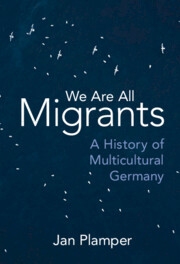Book contents
- We Are All Migrants
- We Are All Migrants
- Copyright page
- Dedication
- Contents
- Figures
- Acknowledgments
- Introduction
- 1 We Are All Migrants, Almost Everywhere, Almost Always – Especially the Germans
- 1945
- 1989
- 6 Germans There, Russians Here
- 7 Jewish Germaniya
- 8 Welcoming Culture
- Conclusion
- Appendix: Dates and Facts
- Notes
- Index
8 - Welcoming Culture
from 1989
Published online by Cambridge University Press: 16 March 2023
- We Are All Migrants
- We Are All Migrants
- Copyright page
- Dedication
- Contents
- Figures
- Acknowledgments
- Introduction
- 1 We Are All Migrants, Almost Everywhere, Almost Always – Especially the Germans
- 1945
- 1989
- 6 Germans There, Russians Here
- 7 Jewish Germaniya
- 8 Welcoming Culture
- Conclusion
- Appendix: Dates and Facts
- Notes
- Index
Summary
The final chapter begins with the “welcoming culture” toward Syrian refugees in 2015 and asks where this groundswell of positive attitudes – and real solidarity, as in helping children with homework or charity donations, making it the largest social movement in German postwar history – towards migrants came from. It shows that what mattered most here were the interlocked processes of civil society initiatives since the middle of the 1980s and a grassroots, unified refugee movement since the late 1990s. Time and again backlashes – Kohl’s conservative government in the 1980s, Thilo Sarrazin’s book Germany Abolishes Itself in 2010, right-wing populism, the NSU Nazi terror group’s murders of nine persons with migration background between 2000 and 2009 – led to resistance, self-organization, and ultimately and painfully, positive change. Legally, the coalition government of the Social Democrats and Greens (1998–2005) engendered the final shift away from an ethnobiological understanding of German nationhood. The chapter closes with an evaluation of the Left’s debate between restricted migration (Paul Collier et al.) and open borders, arguing in favor of the latter.
Keywords
- Type
- Chapter
- Information
- We Are All MigrantsA History of Multicultural Germany, pp. 183 - 217Publisher: Cambridge University PressPrint publication year: 2023

